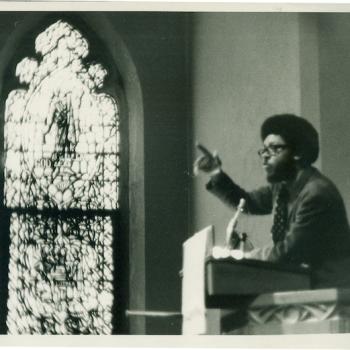Lectionary Reflections
Nehemiah 8:1-3, 5-6, 8-10
January 24, 2016
It is particularly sad and galling that when the word "Watergate" arises in our time, it invariably is taken to refer to one of the most notorious scandals in U.S. political history, a scandal that led to the only presidential resignation our country has suffered. When several bumbling burglars entered the Watergate office/apartment complex in Washington, D.C. on Saturday, June 17, 1972 with the intent to tap the phones of the Democratic National Committee offices — thus assuring, at least in their minds, the reelection of President Richard Nixon, poised for a second four-year term — a chain of events ensued that led to Nixon's resignation from the presidency on August 9, 1974. In a complex and still somewhat mysterious series of illegal activities, hard ball tactics, and sophomoric blunders, the infamous "second-rate break-in" caused the complete collapse of an administration, leading to disgrace for many, and deep shame for all involved. Many have argued that the Watergate events, coupled with the appalling fiasco of the war in Vietnam, stole what innocence may have remained in the minds of many citizens concerning the trustworthiness of the leaders that they themselves elect.
I can never forget how my own mother, when she discovered that my wife and I were voting for Senator McGovern in the 1972 presidential election rather than for my parents' candidate, President Nixon, asked incredulously, "How can you not vote for President Nixon; he is such a statesman!" After Nixon's anger, hatred of his rivals, not to mention his salty language, came fully to light through his recorded office tapes, I tried resolutely not to say to my mother, "I told you so!" It was a supreme act of filial restraint on my part! My mother's response to the scandal was, "All politicians are like that; Nixon was no worse than Johnson and Kennedy before him!" I might argue that point with her, if she were still alive to engage me, but she makes my point: innocence was lost in the wake of the lies and deceptions of the Watergate mess.
We would all do well to remember another scene at the Watergate, though this Watergate is far from Washington, D.C. and far distant in time. We cannot so easily pinpoint the scene specifically, though we may be certain that it happened sometime after the return of the exiles of Israel from Babylon (539 B.C.E.) and sometime during the reconstruction of the fallen walls of Jerusalem (perhaps the middle of the 5th century B.C.E.). We cannot even designate exactly where the scene unfolds, since we cannot be certain what is meant by this Watergate. We are told that it is in a square in Jerusalem that is bounded by a water gate. Since the only source of water for the city is the ancient pool of Siloam, fed by the spring called Gihon that faces the Kidron valley east of the city, we can guess that the square may have been near the reconstructed wall of Nehemiah, the Babylonian agent charged with that responsibility.
In the square a platform has been erected from which another Babylonian visitor, Ezra, an apparently famous scribe, a keeper of the sacred Torah of YHWH, will stand to read from a scroll he has brought with him from the east. There in Babylon, now a city annexed to the vast Persian empire, a flourishing Jewish community has arisen that has codified and copied what will become the Torah, the Bible, what we know as the Old Testament. We cannot know, of course, how much of that Bible Ezra holds in his hands (surely the book of Daniel is not included, since that is a Maccabean creation, some two hundred years in the future), but among the writings we would surely find the five books of Moses, what will come to be called the Torah of the Jews.
We know that the scroll includes more than those five books, since Ezra will read from his scrolls "from early morning until midday" (Neh. 8:3), perhaps four hours at least. And he will read "before the assembly, both men and women and all who could hear with understanding"(Neh. 8:2). Note that there is in this sacred gathering no separation of the sexes, unlike some modern gatherings of Jews in the presence of Torah. The fact that the word "understanding" is repeated in verses 2 and 3 suggests that the Hebrew Ezra was reading may not have been easily understood by all who lived in Jerusalem at the time. After all, Aramaic had become the common diplomatic language of the Near East at least from the 7th century B.C.E. That may also be the reason for the language of Nehemiah 8:8: "So they (not he) read from the book, from the Torah of God, with interpretation. They gave the sense, so that the people understood the reading."
The long list of names given in 8:7 are the "they" of verse 8, clearly interpreters who "helped the people to understand the Torah." It is quite possible that they were interpreters, not only translating the Hebrew to a more common Aramaic, but also were interpreters of the meaning of the words being read to them. The word peres is translated "interpretation," and is used even now as the act of interpreting a text in Judaism.





